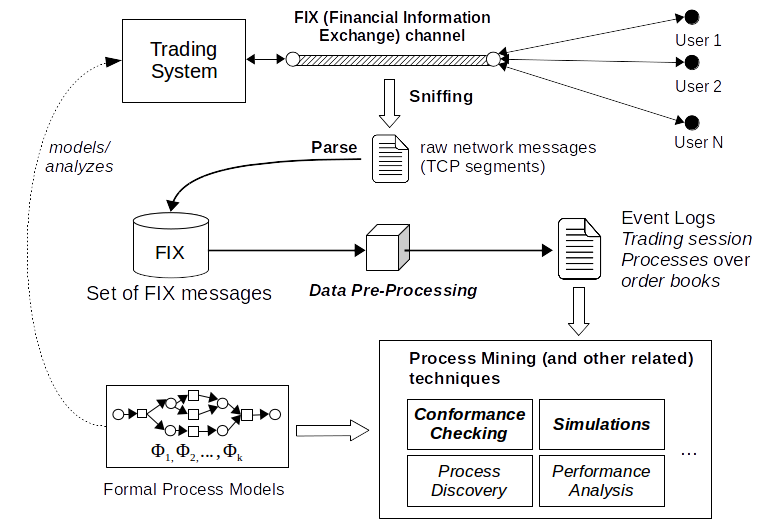Modelling and Validation of Trading Systems
Research Aims

The reliability and robustness of stock trading platforms is crucial for the integrity of global financial markets. Event data from trading systems, i.e, from logging systems or network messages, are widely used to analyze the system's functioning. In this scenario, our research deals with the the application of process mining in trading systems leveraging the event data to produce event logs for process mining analysis. As the picture above depicts, we are carrying out research in the following areas:
- Pre-processing for generating event logs: Extraction of event logs from network messages captured from the trading system interfaces, i.e, encapsuled in the Financial Information Exchange (FIX) protocol or other similar standards.
- We have developed some command-line tools for the extraction of event logs from a capture of FIX messages (see below in our repository section). In particular, the event logs are related to: (1) the trace of orders from market participants to buy or sell stocks and (2) the trading session in order books (where stocks are stored, ranked and crossed).
- As a small example, with event logs of type (1) we can synthesize the observed behavior of traces, whereas with event logs of type (2) we can replay the trading session of order books in more elaborated interfaces (see images below).


- Formal modelling: Development of adequate formalisms, i.e, based on high-level Petri nets, to specify the system behavior. For example, to describe the interplay of market participants with order books. For the latter, we are researching in the development of appropiate formalisms to describe the interaction of multi-agent systems with databases. Moreover, we aim to develop a formalism that may be used in other similar scenarios where agents interact with global data structures.
- Simulation: Use of the formal models to generate computer test scenarios for analysis.
- Conformance Checking: Comparison of the formal process models (which describe the expected behavior) with the event logs (which describe the observed behavior) in order to diagnose possible system misbehavior. While the state-of-art of conformance checking is focused in the control-flow perspective, i.e. causal dependence between activities, we instead focus our research in the development of more appropiate data-driven heuristics, i.e, taking into account the current values in orders and order books.
- And application of other process mining techniques...
Project members
- Project Researcher: Julio C. Carrasquel
- Supervisor: Irina A. Lomazova
Project Repository
Please visit our research project repository in Github!There you will find the source code and executable jar files for some project tools such as for pre-processing FIX messages to generate event logs, as well as an order book interface for replay and simulation support. You will find as well other material such as Petri net models, event log examples, among other resources... We are in constant update of this repository improving and adding material.
References
- Carrasquel, J.C., Lomazova, I.A. Modelling and Validation of Trading and Multi-Agent Systems: An Approach Based on Process Mining and Petri Nets. Proceedings of the ICPM Doctoral Consortium co-located with the 1st International Conference on Process Mining (ICPM 2019). Aachen, Germany, June 23, 2019.
Have you spotted a typo?
Highlight it, click Ctrl+Enter and send us a message. Thank you for your help!
To be used only for spelling or punctuation mistakes.